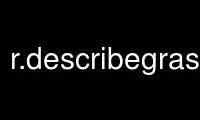
This is the command r.describegrass that can be run in the OnWorks free hosting provider using one of our multiple free online workstations such as Ubuntu Online, Fedora Online, Windows online emulator or MAC OS online emulator
PROGRAM:
NAME
r.describe - Prints terse list of category values found in a raster map layer.
KEYWORDS
raster, metadata
SYNOPSIS
r.describe
r.describe --help
r.describe [-1rndi] map=name [null_value=string] [nsteps=integer] [--help]
[--verbose] [--quiet] [--ui]
Flags:
-1
Print the output one value per line
-r
Only print the range of the data
-n
Suppress reporting of any NULLs
-d
Use the current region
-i
Read floating-point map as integer
--help
Print usage summary
--verbose
Verbose module output
--quiet
Quiet module output
--ui
Force launching GUI dialog
Parameters:
map=name [required]
Name of raster map
null_value=string
String representing NULL value
Default: *
nsteps=integer
Number of quantization steps
Default: 255
DESCRIPTION
r.describe prints a terse listing of category values found in a user-specified raster map
layer.
r.describe ignores the current geographic region and mask, and reads the full extent of
the input raster map. This functionality is useful if the user intends to reclassify or
rescale the data, since these functions (r.reclass and r.rescale) also ignore the current
geographic region and mask.
The nv parameter sets the string to be used to represent NULL values in the module output;
the default is ’*’.
The nsteps parameter sets the number of quantisation steps to divide into the input raster
map.
NOTES
FLAGS
If the user selects the -r flag, a range of category values found in the raster map layer
will be printed. The range is divided into three groups: negative, positive, and zero. If
negative values occur, the minimum and maximum negative values will be printed. If
positive values occur, the minimum and maximum positive values will be printed. If zero
occurs, this will be indicated. The range report will generally run faster than the full
list (the default output).
The -d flag can be used to force r.describe to respect the current region extents when
repoting raster map categories. The default behavior is to read the full extent of the
input raster map.
If the -1 flag is specified, the output appears with one category value/range per line.
The -n flag suppresses the reporting of NULL values.
EXAMPLES
The following examples are from the Spearfish60 sample Location:
# Print the full list of raster map categories:
r.describe landcover.30m
* 11 21-23 31 32 41-43 51 71 81-83 85 91 92
# Print the raster range only:
r.describe -r landcover.30m
11 thru 92
*
# Print raster map category range, suppressing nulls:
r.describe -n landcover.30m
11 21-23 31 32 41-43 51 71 81-83 85 91 92
# Print raster map categories, one category per line:
r.describe -1 geology
*
1
2
3
4
5
6
7
8
9
Use r.describegrass online using onworks.net services
